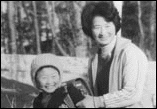|
|
 |
製作:奈緒ちゃん製作委員会・デコ企画 Production Company : " Nao-chan " Production |
| 演出の伊勢真一は、かつて日本のドキュメンタリー映画界で重要な編集者の一人であった伊勢長之助の息子である。長之助の死後、彼に捧げられる形で、長之助と同時代を共にしたカメラマン瀬川順一らスタッフは、その孫娘の奈緒ちゃんの成長の記録を始めた。彼等が撮影を始めたのは1983年。主人公の奈緒ちゃんは8才になっていた。彼女は重度のてんかんと知的障害を持っており、母親と家族は彼女を暖かい視線で包みながらカメラはその成長を親密に捉えてゆく。それはスタッフと家族が既に十分な関係を結んでいることで可能になった。奈緒ちゃんはその明るい性格によって街の人々にも優しく迎え入れられており、母親にそして家族にとって大きな「幸福」をもたらすようになる。しかし成長するのに伴う幾つかの不安も無いわけではない。父親は男の立場から彼女の結婚は不可能だという。しかし母親の望みは奈緒ちゃんが結婚することである。そして奈緒ちゃんの存在によって母親は他の障害児たちあるいは母親たちとの豊かな関係を結び、障害児たちのための地域作業所のリーダー的な存在になってゆく。この作品は社会の中で障害児が生きてゆく困難や問題点を明らかにすることに重点を置くのではなく、奈緒ちゃんという少女のキャラクターとその理解を我々に見せるのである。難病と闘う家族の姿ではなく、住宅街の中の小さな公園が社会の接点となり、そこから彼女たち障害児の世界が広がる可能性を見つめようとする。 | Director Ise Shin'ichi is the son of the late Ise Chonosuke, a prominent Japanese documentary film editor. After Chonosuke's death and in dedication to him, the film crew started to document the growth of Nao-chan, Chonosuke's grand-daughter. The crew included cameraman Segawa Jun'ichi, Chonosuke's contemporary and colleague. They began filming in 1983, when Nao-chan was eight years old. Nao-chan has epilepsy and a serious learning disability. She is enveloped in the warm gazes of her mother and other family members as the camera captures the details of her growing up. The intimacy is made possible by the well-established relationship between the film crew and the family. Because of her cheerful nature, Nao-chan is warmly welcomed by the townspeople, and she eventually brings a great sense of happiness to her mother and the family. But growing up is not all easy. Nao-chan's father, from his male point of view, says that marriage is an impossibility. But her mother's wish is that Nao-chan should marry. Through Nao-chan, the mother develops meaningful relationships with other handicapped children and their mothers, and plays a leading role in the local workshop for handicapped children. This film does not set out to shed light on the hardships and problems that disabled children face in this society, but rather gives us insight into the character of a girl named Nao-chan. Instead of exploring one family's struggles with chronic illness, the film tries to look at the possibilities of a wider world for Nao-chan and other disabled children, as a small park in a residential area becomes a point of contact with the larger society. |